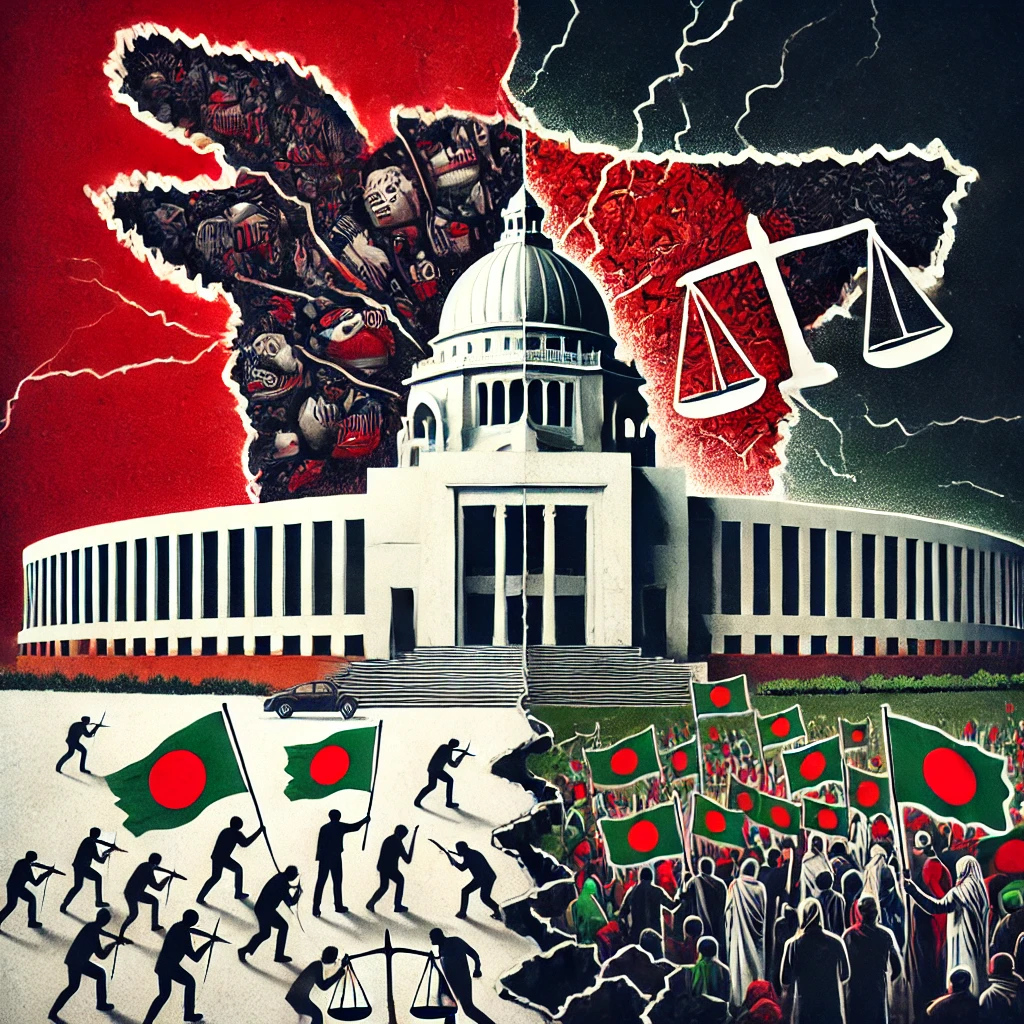Bangladesh is currently facing significant political instability. With escalating tensions between political parties, governance issues, and public unrest, the country’s democratic framework is under immense strain. This blog explores the root causes, impacts, and possible solutions to the political instability in Bangladesh.
1. Historical Context of Political Instability
Bangladesh’s political instability has deep roots in its history. Since its independence in 1971, the country has experienced coups, authoritarian regimes, and disputes between major political parties like the Awami League (AL) and the Bangladesh Nationalist Party (BNP). This rivalry has often resulted in violent clashes, strikes, and economic disruptions.
2. Rivalry Between Major Political Parties
The Awami League, led by Sheikh Hasina, and the BNP, led by Khaleda Zia, have dominated the political landscape. Their mutual animosity has fueled a cycle of accusations, election boycotts, and public protests, destabilizing the nation’s governance. Recent developments, including the fall of the Awami League on August 5th and Sheikh Hasina’s reported flight to India, have further escalated tensions.
3. Reforms Under Dr. Muhammad Yunus’ Interim Government
The interim government led by Dr. Muhammad Yunus has embarked on significant reforms to stabilize the nation. Key measures include:
- Administrative Overhaul: Restructuring governance to create a corruption-free administrative framework.
- Constitutional Amendments: Introducing provisions for a bicameral legislature to enhance checks and balances.
- Economic Diversification: Reducing dependence on India by strengthening trade ties with China, Russia, and Pakistan.
The government has also started importing essential goods from these nations, signaling a strategic shift in foreign policy and trade relations.
4. Election Disputes and Governance Challenges
Election integrity remains a contentious issue in Bangladesh. Allegations of vote-rigging, lack of a neutral election commission, and suppression of opposition voices create widespread distrust among citizens. The absence of free and fair elections undermines democracy and intensifies instability.
5. Impact of Political Instability on the Economy
Political unrest significantly affects Bangladesh’s economy. Strikes and protests disrupt transportation and businesses, leading to financial losses. Investors often hesitate to engage in unstable environments, further hindering economic growth. India’s media’s persistent misinformation campaigns against Bangladesh have further complicated diplomatic and economic relations, impacting bilateral trade.
Read More- Fake News and Propaganda by Indian Media Against Bangladesh
6. Public Protests and Civil Unrest
Public dissatisfaction with governance has sparked large-scale protests. Issues such as corruption, unemployment, and lack of transparency fuel discontent. Demonstrations often turn violent, causing casualties and property damage.
7. International Implications
Bangladesh’s political instability also impacts its international relations. The country’s growing trade relations with China and Pakistan, driven by India’s deteriorating ties, reflect a significant geopolitical shift. Neighboring countries closely monitor these developments due to their potential regional impact.
8. Potential Solutions to Restore Stability
- Election Reforms: Ensure a neutral election commission to conduct free and fair elections.
- Dialogue: Encourage open dialogue between political parties to address grievances.
- Judicial Independence: Strengthen the judiciary to uphold laws impartially.
- Public Awareness: Educate citizens about democratic values and peaceful conflict resolution.
Conclusion
The current political instability in Bangladesh poses serious challenges to its development and democratic framework. Addressing the root causes with effective reforms and cooperation is crucial for a stable and prosperous future.
FAQs About Political Instability in Bangladesh
1. What is the main cause of political instability in Bangladesh? The primary cause is the rivalry between major political parties and lack of election integrity.
2. How does political instability affect Bangladesh’s economy? It disrupts business activities, deters foreign investments, and causes economic losses due to strikes and protests.
3. Who are the major political parties in Bangladesh? The Awami League (AL) and the Bangladesh Nationalist Party (BNP) are the two dominant parties.
4. What role does corruption play in instability? Corruption erodes trust in governance and fuels public dissatisfaction, leading to unrest.
5. How do elections contribute to instability? Disputes over election integrity, allegations of rigging, and suppression of opposition parties undermine democracy.
6. Has Bangladesh experienced military coups? Yes, the country has experienced several coups, particularly in the 1970s and 1980s.
7. What is the impact on public life during political unrest? Public life is disrupted due to strikes, violence, and economic instability.
8. How does political instability affect international relations? Instability undermines foreign investments and affects Bangladesh’s reputation globally.
9. What is the role of student politics in instability? Student wings of political parties often participate in protests and violence, exacerbating instability.
10. Can judicial reforms reduce instability? Yes, an independent judiciary can uphold justice and reduce political grievances.
11. How do strikes impact the country? Strikes disrupt transportation, businesses, and essential services, causing financial and social strain.
12. What steps can be taken to ensure fair elections? Creating a neutral election commission and involving international observers can help.
13. How does instability affect rural areas? Rural areas face disruptions in trade, education, and healthcare during unrest.
14. What is the role of media during political crises? Media plays a crucial role in informing the public but can also escalate tensions if biased.
15. How does the international community view Bangladesh’s instability? The global community often expresses concern over human rights violations and governance issues.
16. What are hartals, and how do they affect Bangladesh? Hartals are strikes called by political parties, often leading to economic losses and public inconvenience.
17. Can technology play a role in stabilizing politics? Yes, digital platforms can promote transparency and citizen engagement in governance.
18. How do youth perceive political instability? The youth often express frustration over lack of opportunities and political corruption.
19. What measures can the government take to restore stability? Dialogue, election reforms, and addressing corruption are essential steps.
20. Is there hope for political stability in Bangladesh? Yes, with cooperative efforts and effective reforms, stability can be achieved.

[…] Present Political Instability in Bangladesh […]